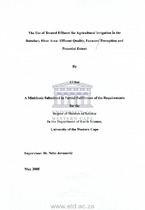The Use of Treated Effluent for Agricultural IrrigatiOn!n the Bottelary River Area: Effluent Quality, Farmers Perception and Potential Extent
Abstract
The Bottelary River area is located in a Mediterranean climate region, where the agricultural sector plays an important role. During the dry summer season, there is not enough precipitation to meet the agricultural irrigation requirements. Some farmers extract river water which is practically the final treated effluent from the Scottsdene Wastewater Treatment Works (WWTW) to irrigate crops. This research investigates
the use of treated effluent for agricultural irrigation in this area, particularly focuses on the effluent quality, farmers' perception, and the potential extent. The Bottelary River area is located in a Mediterranean climate region, where the agricultural sector plays an important role. During the dry summer season, there is not enough precipitation to meet the agricultural irrigation requirements. Some farmers extract river water which is practically the final treated effluent from the Scottsdene Wastewater Treatment Works (WWTW) to irrigate crops. This research investigates the use of treated effluent for agricultural irrigation in this area, particularly focuses on the effluent quality, farmers' perception, and the potential extent. The methods used in this research included the statistical analysis of the effluent quality and questionnaire analysis of the collected data. In addition, the research employed the SAPWAT model to calculate the irrigation requirements and the potential area that could be irrigated by treated effluent. The research indicated that the effluent quality variables in general complied with the regulation of requirements for the purification of wastewater or effluent (known as 1984 general standard), which controlled the wastewater treatment works discharging final effluent to the watercourses. The only exception was faecal coliform
concentration, which exceeded the general standard in certain periods. According to the South African water quality guideline on irrigation water use, the treated effluent should be used with caution, in order to minimize the potential risks, protect the public health, crops, soil and surface waters and groundwaters. The research found that although the farmers' attitudes were various, their most important concerns were on the effluent quality. The farmers cared for the impact of this unconventional water sources to human beings' health, crops and soil. Thus,
eliminating the concerns amongst the farmers and solving the problems met during the practice would contribute to the use of treated effluent in agricultural irrigation in this area. The research indicated that during the normal dry summer season, treated effluent could act as an additional water resource to meet irrigation demand. During the normal wet winter season, the treated effluent was surplus compare to the irrigation requirements due to the ample precipitation. The treated effluent needs to be stored in dams to fulfill the summer peak demand. In order to promote the use of treated effluent as an additional water resource in agricultural irrigation, improved technologies, comprehensive monitoring systems and an extended public participation need to be established.

